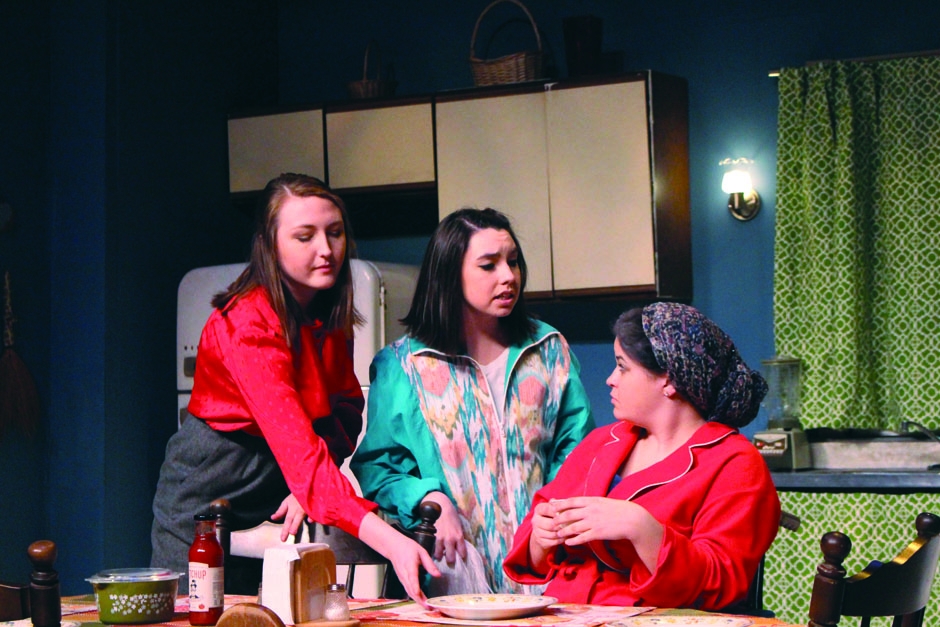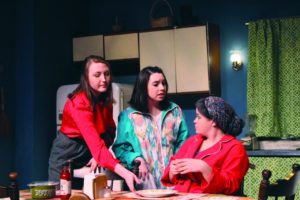

The Red Masquers put on multiple shows per semester, “Rust” being the first of their Spring 2017 season. Last fall, they put on “Avenue Q” and “How I Learned to Drive,” as well as a series of unique one-acts for “Premieres XL.” “Rust” runs till Feb. 26.
By Josiah Martin | Staff Writer
Performers are sometimes limited by what is on the paper in front of them. But when the source material’s flaws are corrected by an amazing cast, you have a recipe for success. In this case, “Rust” by F.J. Hartland is that source material. As a play, it covers the social and economic issues of 1980s Pittsburgh with varying degrees of success, but the Red Masquers have put on a fantastic performance, almost fully distracting from the shortcomings of the work itself.
The time and place in which “Rust” occurs are the centerpiece of the play. It does seem to succeed in evoking the “essence” of the ’80s. The mood is set by occasional radio interruptions of news headlines from the era of Cold War tension and economic uncertainty. This, combined with the Red Masquers’ set design, get the point across within the first few seconds: This is the ’80s, and we as a country are not doing very well.
The actors themselves excel at portraying the Strnad family. Hartland’s dialogue combined with the performances of the cast, in particular Alex MacLeod as Zuzana, effectively paint a realistic picture of a small middle-class family. It actually seems like we are sitting in on a real family dinner. On the topic of realism, the young Matus (Mark Henne) and his imaginary friend Yunus (Byron Stroud) have an unrivaled chemistry on stage, the dialogue between them being funny— and, frankly, adorable—throughout the whole show.
This cast of characters’ financial struggle serves as the major conflict in this play, after Marek Strnad (Neil Donaldson) is laid off from his job at the mill. Donaldson does a fantastic job of portraying Marek’s slow descent into helplessness as these issues progress. Evan W. Saunders’ portrayal of Marek’s Pavol is notably high-quality as well. He seems deeply bothered by the situations he finds himself in but gleefully shrugs them off with the optimism and self-confidence of a young college student.
These performances, however, fail to cover a few confusing points in this play. The writing makes it fairly unclear as to how seriously we are supposed to take this conflict. The Unemployment Clerk (Lauren Gardonis) provides perfect comedic relief, but strangely, during scenes that should seem otherwise pivotal and serious in Marek’s quest to regain financial stability. Marek’s quest to find the men who assaulted Pavol seems to sort of fizzle out. A few lines of dialogue and the whole situation is treated as resolved, when in reality, the audience is still wondering who is responsible. The Bartender (Max Begler) is an extremely likeable and well-acted character, but that aforementioned loose end leaves him seeming suspicious, as the only character we meet who could have known what really happened.
The most relentless quirk in Hartland’s writing itself is that he wrote the play not only clearly about the ’80s, but aggressively about the ’80s. The story covers social and economic issues of the decade, while Lenka Strnad (Lauren Bostedo) hilariously portrays the decade’s stereotypical annoying sitcom daughter, and The Bartender rattles off Pittsburgh sports facts of the era one after another. Yes, this play works better in the ’80s than it would in any other decade, but by the second after the lights come on, the audience understands the time period, it doesn’t need constantly reinforced.
By the end of show, however, these minor flaws are overshadowed by the strength of the cast. Verka (Raquel Isabel Millacci) ties the show together as the “stable” character. She successfully wrangles the family and keeps Marek on the right track until the very end. I recommend seeing “Rust” this weekend, if only to briefly be a part of the Strnad family. You won’t regret it.




